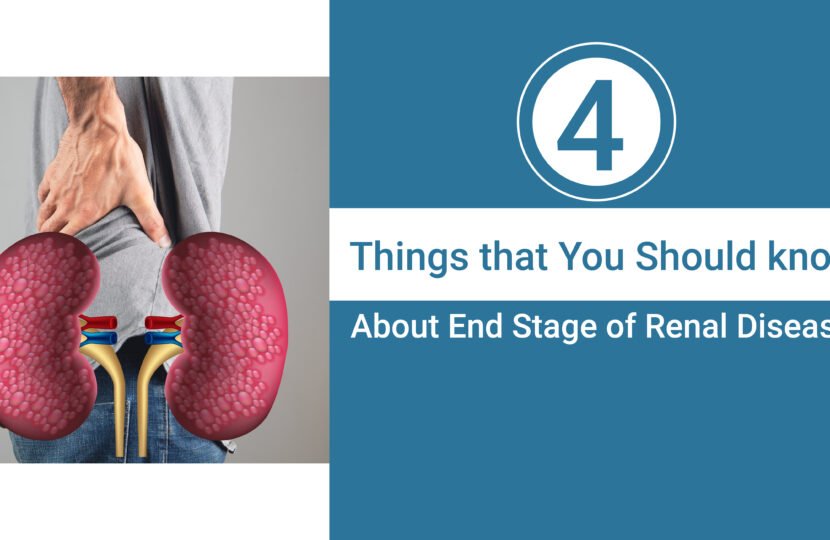Renal disease is one of the most alarming and common diseases across the globe. There are several levels of severity of this disease and end stage renal disease happens to be the last stage of acute or chronic renal failure. This stage of renal disease is developed with the loss of functioning of the affected kidney. The patient is said to reach this stage of kidney disease when the functioning of the kidney becomes insufficient in comparison to the needs of the body.
The reason behind the alarm that the end stage of renal disease brings is the fact that certain changes that occur due to it in the body are fatal. These changes include the building up of waste materials in the body, imbalance of electrolytes, deregulation of blood pressure, etc. There are various parameters related to this stage of renal disease that one must be aware about.
What are the symptoms of End Stage Renal Disease (ESRD)?
The problem with renal disease is that there are very less symptoms at the beginning of this condition. However, at the end stage of renal disease, the body is going through many physiological changes which create a lot of symptoms. This is because at this stage of renal disease kidney becomes functionless and in a normal state, the kidney performs a wide range of functions in the body. Some of the general symptoms of end-stage renal disease (ESRD) are:
- Inflammation in the feet
- Unexplained weight loss
- Insomnia
- Loss of appetite
- Have trouble in sleeping
- Reduced urine output
- Inflammation and pain in the joints
- Itchiness in several areas of the body
- Bleeding through nose
- Lack of concentration
Although these are actually the symptoms of renal disease in general, people with ESRD experience all these symptoms with varying intensities.
What are the causes of ESRD
Aetiology of end-stage of renal disease includes the underlying health issues that happen to be the cause of slow damage of the kidney to the point when the symptoms of it become apparent. Usually, by the time when the symptoms of renal disease start to be shown, it has reached some later stage. The diseases that cause the onset of renal disease are considered to be the cause of ESRD and most of the time these underlying diseases affect the functionality of the kidney.
Two of the major causes of ESRD are hypertension and diabetes
Hypertension: High blood pressure is caused due to the constriction of nerves in comparison to the flow of blood. In the state of hypertension, the blood flows in large volumes with high pressure. These properties of blood are harmful to the nerves as well as the cellular tubules of the kidney. Renal disease is caused when hypertension leads to damage to the nerves and tubules of the renal system.
Diabetes: The nephrons are the cells of the kidney and are comprised of highly convoluted nerves and tubules through which blood has to pass. In the state of diabetes, the blood is comprised of high sugar content. When this blood passes through the convoluted and narrow tubules of the nephrons, it damages the functional units of the kidney.
Apart from these two main causes, there are several less common causes of end-stage of renal disease:
- Hereditary diseases in the kidney
- UTI
- Glomerulonephritis
- Proteinuria
- Taking NSAIDs (painkillers) over a long period of time
- Pyelonephritis, in which the infection is recurrent in the kidneys
Who is at risk of developing ESRDS?
The development of any stage of renal disease is highly dependent on certain factors of an individual. Risk factors for developing the end-stage renal disease are:
- History of acute kidney disease
- Hypertension
- Deregulated diabetes
- Smoking
- Ethnicity
- Age
- Usage of painkillers over a longer period of time
What can be done to prevent ESRD?
One should be clear about the fact that kidney damage by renal disease is an irreversible process. However, it is always better to delay the progression of this disease as the end stage of renal disease comes with many complications, one of which can be fatal. So, the prevention of ESRD means decreasing the rate at which the kidney is damaged. This prevention can be done by taking some lifestyle-changing majors, which are:
- Regulating body weight
- Not being sedentary
- Reducing proteins in the diet
- Reducing sodium intake
- Having your hypertension in control
- Taking the prescribed medication
- Regulating your blood sugar levels
- Quitting smoking today
- Not avoiding medical checkups
Conclusion
End-stage renal disease (ESRD) is a life-degrading stage of renal disease. There are various life-threatening complications that come along with renal disease but one can always slow the process of this damage by taking preventive measures. After total kidney failure, the patient has left with the option of dialysis and eventual transplant. However, it is always wise to elongate the period for one can be functional on the own kidney. This can be done by taking consultation to prevent the end stage of renal disease by an experienced practitioner.
At Alfa Kidney Care center, you will get consultations from leading nephrologists. To make an appointment, contact us at Alfa Kidney Care


